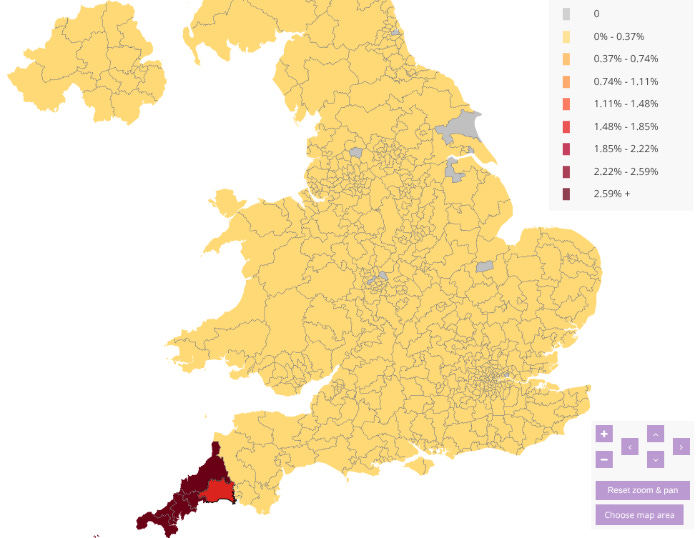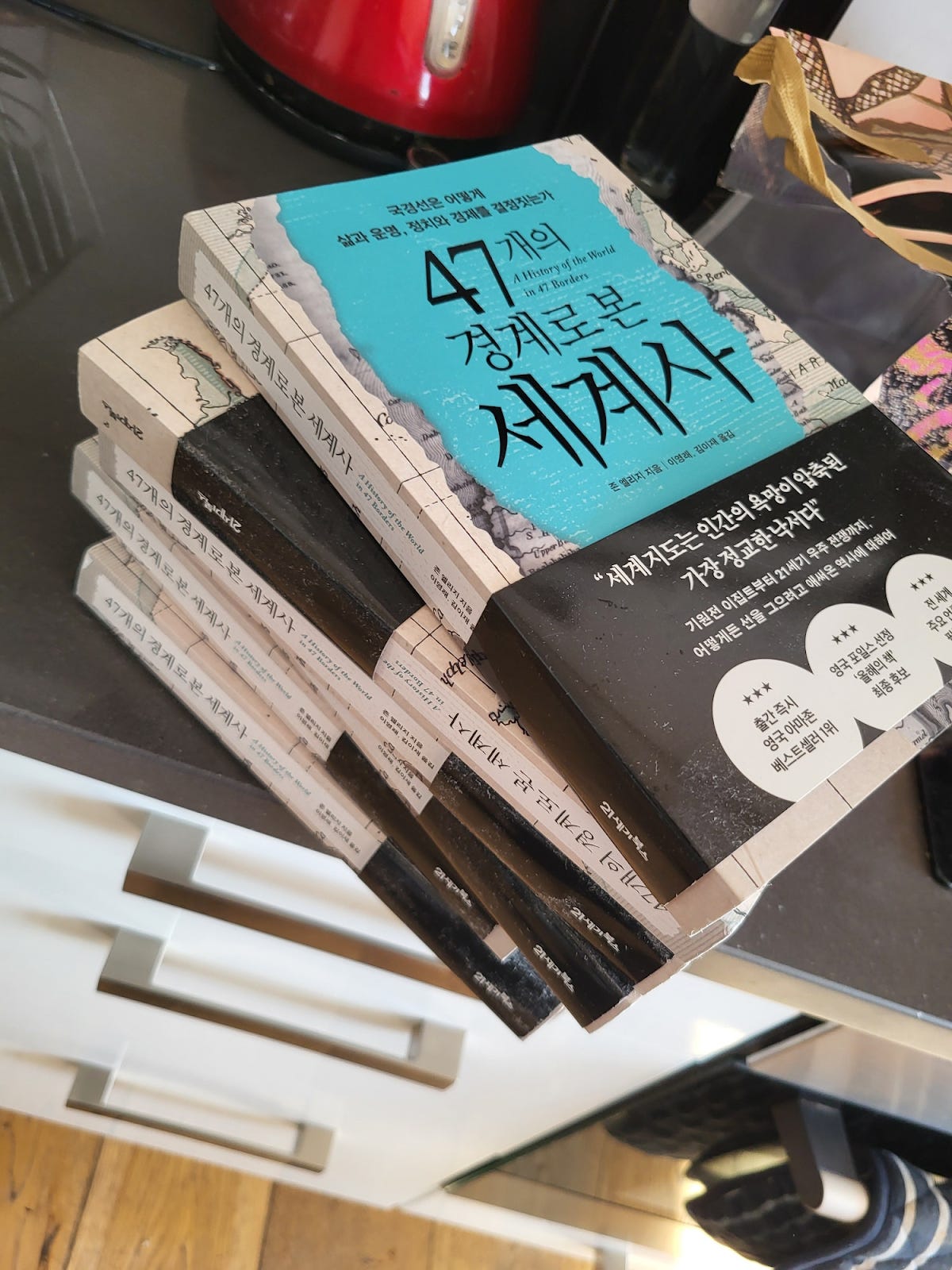From the Outside
This week: everything I thought about Labour conference while not being there. Also: a deep dive into Cornish separatism and the nature of national identity.
The weird thing is, I love conference season. You’re not meant to say this, especially as a journalist – you’re meant to adopt a weary pose that it’s an exhausting inconvenience which eats several weeks of your life when you could be with people you actually like. But I do like politics nerds, even the ones I disagree with. I like the excuse to travel around the country, to stay up too late drinking and debating with people I know and people I just met. I like the sense of being where it’s happening even though it isn’t. The thought occurs that this is basically what real boys get from following football, but all the same: I find it fun. So sue me.1
And this year, for the first time since I had a professional excuse to attend, I just couldn’t be arsed.
One reason for this is – this’ll throw you – mounjaro: an unexpected benefit I’ve found from the weightloss drug is that whatever it does to rewire the reward mechanisms of the brain has cured my lifelong FOMO. The other, less surprising reason is that the Labour leadership has of late been awful. And the natural reaction to seeing something you used to like on fire is rarely to move closer so you get a better view of the flames.
Anyway, I’ve not been there, so can offer no sense of the mood. But for the record, from my comfortable sofa back in London, there are three things that have made me want to howl.
One is that, not for the first time, the governing party arrived in a northern city for a conference to the accompaniment of news reports that said city would not be getting the new train line it had been promised after all. Chancellor Rachel Reeves has played down the probability of yet more delays to Northern Powerhouse Rail; and it seems like an unfortunate side effect of the fiscal situation, rather than the active “F*ck you” which Rishi Sunak delivered in 2023. Nonetheless, it’s a sign that even the good things about this government – like its apparently sincere determination to increase investment – may founder thanks to its own inability to make and deliver a plan.
Then there was the news on Tuesday that a couple of left-wing journalists (Rivkah Brown; Owen Jones), plus the anti-homelessness campaigner Matthew Torbitt, had been kicked out. You don’t have to share their politics to think this a bad thing: Reform was barring those it found inconvenient from its own conference just three weeks ago, and not for the first time I found myself thinking that whoever it is at the top of Labour who’s looking at the Faragists and thinking “Oh that’s a good idea” should be booted from the party, sealed in a lead lined box and dropped into the sea.
Which leads me to my last and greatest howl of rage. On Sunday, Keir Starmer described Reform’s plans to revoke residence from migrants who’ve been in Britain for years as “racist” and “immoral”. (His conference speech repeated this theme.) He’s right: it’s good he said it, even if it’s bad that it took him so long. But almost at the same time the Home Secretary, Shabana Mahmood, was outlining plans that would load yet more requirements on migrants, not just to learn English (reasonable, if largely unnecessary), but to volunteer in their community (what?) before they qualified for such status.
Mahmood claimed this would “ensure contribution to this country is a condition of living here”. But that rather suggests that working long weeks in the NHS, or in a social care system that pays too poorly to attract homegrown staff, isn’t enough of a contribution in itself. Come to that, it implies that simply working and paying taxes, or finding love or friendship or doing almost literally anything else, aren’t also contributions to the life of this country, even though they very clearly are.
It’s not just that this is mean-spirited, or that it asks things of newcomers we would never ask of ourselves, though it is both of those things. It also raises questions that spokesministers have been struggling to answer. One of the best arguments against inauthenticity in politics is that, if you say what you think, then at least you can defend the government line.
Anyway, that’s why I didn’t fancy this year’s Labour conference. If I’d wanted this kind of nonsense, I’d have gone to Reform’s.
Some light self-promotion
On Monday a package arrived containing six copies of the book in Korean. I have no idea what to do with them – if you would like one, please enquire within – but they’re lovely:
My equally lovely translator Professor Kim Eje sent me this photo of it in the shops. While I’m at it, I’ve been recommended on Portuguese television, AND I, briefly, made some regional bestseller lists in the US. (#14 in indy bookshops in the Pacific North West, #12 in New England, and #5 in the MidWest!) As long as I focus on that and not what’s happening in the world outside my window, everything is going very well!
Anyway, I also had a lovely time chatting 47 Borders on the Academic Life podcast – so if you want another hour of me monologuing about borders for some reason then I have just the show for you.
Could Cornwall really become the fifth nation of the UK?
In 1956, Malta failed in its bid to become the fifth nation of the UK; in 2025, a new contender has emerged. There’s been a petition. There’s been a vote. There’s been a government response that can be translated as “Bugger off and stop being silly”, admittedly – but if history holds any lessons, it’s that nationalism can’t always be put back in the box, even when outsiders think it ridiculous.
So – could Cornwall really take its place in the brotherhood of nations? And what would it mean if it did?
The story so far
The petition appeared on the Parliament website two days after Christmas. Try not to quake too much as you read its demands (or, come to that, its American spelling).
“We urge the UK Government to formally recognize Cornwall as a nation, granting it equal status to Wales and Scotland. This includes devolved powers, cultural preservation, and official recognition of Cornwall’s distinct heritage, language, and historic autonomy.
“Cornwall has a rich cultural and historical identity, distinct from the rest of England, with its own language, Kernewek, and heritage. Despite being part of the UK, Cornwall’s history as a Duchy reflects its unique status. We think granting Cornwall nation status would preserve its culture, promote self-governance, and could empower its people to address local issues.”
People post a lot of petitions to this website – a couple of dozen have appeared just since Monday morning, covering everything from mayoral term limits to pensions for Gurkhas to making tattoo artistry a licensed profession. Very few of them get news coverage or even, frankly, noticed.
The reason this one is at least slightly different is that the council got behind it. In late July, Councilor Dick Cole – leader of Mebyon Kernow, the peninsula’s answer to Plaid Cymru or the SNP – put forward a motion demanding the British government recognise Cornwall as a nation. That passed by 53 to 22, with two abstentions and opposition overwhelmingly concentrated among Reform. “This is not a slogan or a branding exercise,” said the council’s leader, LibDem Leigh Frost. “It is a statement of fact and a declaration of intent.”2

I’m not sure how many people had signed the petition before this – I suspect, given it had been sitting there seven months already, it was the vote that lit the fire. But shortly afterwards, it had hit 12,000 signatures, and got write ups from the likes of the Times and BBC. In August, Frost released a video encouraging more people to sign. “This isn’t about independence, it never has been,” he says, while walking about for some reason. “This is about making sure decisions about Cornwall are made in Cornwall.”
Is it actually a nation, though?
Cornwall was one of the last counties to be incorporated into England, probably sometime in the 10th century. (It’s a bit hazy.) As with other rugged and far-flung regions like Cumbria and Wales, it retained much of its previous Romano-British identity, speaking a local variant of the Brittonic language (Cornish, or Kernewek), long after the lowland part of the island had switched to English. It all fits neatly into our traditional but quite possibly misleading national story, of the original inhabitants of the island being driven to its rockier fringes by the Anglo-Saxon invaders.
There are two main planks to the argument that Cornwall had a different relationship to England and Englishness than, say, Lancashire. One is that it had its own parliament, the Stannary Parliament, right up until 1753. How big a deal this is depends on who you ask and which side they’re on: some point out it merely oversaw the tin trade, making it sound like more of a guild than a representative body; others, that the industry was so powerful locally that the Stannators (great word) could effectively pass legislation governing everyone in Cornwall. Could go either way.
The other is the persistence of Cornish which, like its close relative across the sea in Wales, outlived the Middle Ages. Gradually, though, English encroached further and further west. Here’s a suspiciously neat map:
Keep reading with a 7-day free trial
Subscribe to The Newsletter of (Not Quite) Everything to keep reading this post and get 7 days of free access to the full post archives.

